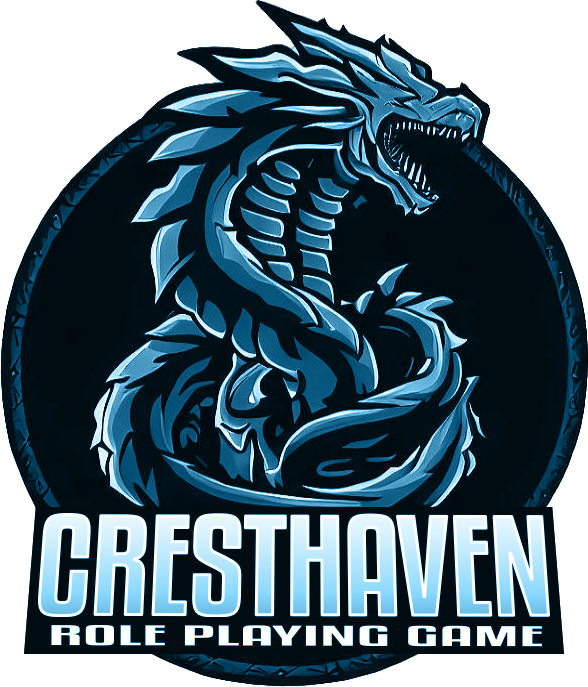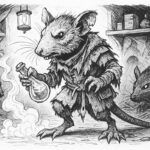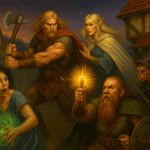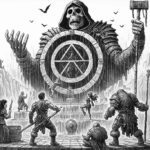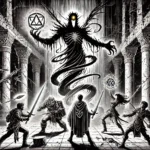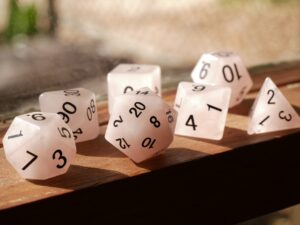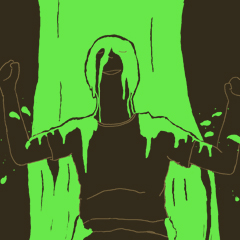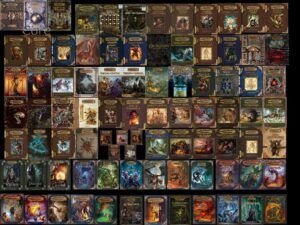
When you’re running a campaign, dealing with absent players is an inevitable part of being a Dungeon Master (DM). Whether your group plays weekly or just once a month, missing players can interrupt the flow of the game if not handled thoughtfully. Below are some ideas and tips on how to manage absent players smoothly, ensuring that the campaign continues without a hitch.
🧙♂️ For tips on keeping players coming back to your game, check out this blog post!
Prepare for Absences Ahead of Time
The best way to handle absences is to plan for them. Encourage your players to communicate in advance if they can’t make it, and ask them to leave instructions for how their character should behave in their absence. This could be as simple as a quick note on preferred actions, behaviors, or spells to cast. Having a plan in place helps avoid those last-minute “what do we do now?” moments.
The Autopilot Character
This is a very common and low-effort approach. The absent player’s character fades into the background, following the group on autopilot. They avoid making any key decisions but help with menial tasks like carrying extra supplies or lighting a torch. The party can trust that the character is still there but won’t require attention or major interactions. If combat happens, the character can make basic, non-flashy moves, like attacking the nearest enemy or dodging.
The “Stayed Behind” Approach
If the session doesn’t demand the player’s character presence, have them “stay behind at the inn” or another safe place. This option works well when your campaign allows downtime between major events, and it prevents the character from experiencing consequences that they’d normally have a say in (like injury or bad decision-making). You could even say they’ve taken on a personal errand in town, collecting supplies or researching the next mission.
The Runaway Character
Occasionally, a character may feel compelled to leave the party for personal reasons, like seeking revenge on a villain or embarking on a mysterious side quest. This can be played up for narrative purposes, and the party can decide whether or not to pursue them. It gives the absent player a unique plot hook for their return and adds tension to the group as they wonder why their companion has left so abruptly. Be careful not to overuse this option, as frequent disappearances can break immersion.
The Sudden Quest Character
If your game is set in a world rich with deities, spirits, or powerful beings, a character might be summoned on a quest or mission while their player is away. This explanation ties into the lore of the game and can be a good way to build some mystery around the character’s absence. Upon returning, the player can share the details of their quest as part of the story, adding depth and personal growth to their character.
DM-Controlled Character
In some cases, the DM may take control of the absent player’s character, playing them as a non-player character (NPC) for the session. While this can add extra work for the DM, it keeps the character present in the story and prevents major narrative disruption. Be sure to play the character true to their established traits and avoid making significant, irreversible decisions on their behalf. It’s also a good idea to limit how often this approach is used, as it can pull focus away from other players.
The Body Snatcher
Another option is to let a trusted player take control of the absent character. In this case, the player runs two characters for the night. To make it fun and humorous, you might even hint that the character’s personality is slightly off, calling it a “body snatcher” moment. Maybe the character suddenly becomes overly optimistic or paranoid—just enough to keep things lighthearted and fun while still contributing to the gameplay.
Strategic “Injuries” or Magical Effects
If combat is frequent and the absent character’s role is crucial, a simple solution is to have them injured or incapacitated temporarily. They could be knocked unconscious in a previous battle, stricken with a magical curse, or enchanted to sleep until the player returns. This keeps the character with the group but safely out of action, avoiding the need for anyone to run the character in combat.
Utilize NPCs for Storytelling
Another option is to temporarily replace the absent player’s character with an NPC. The NPC could be an informant, a guide, or even a rival temporarily assisting the party. This lets you fill the character gap while adding story-driven elements that engage the party. The NPC could serve as a tool for moving the plot forward, providing information, or even offering a side quest, while the absent player’s character is still explained away.
“Cinematic Flashback” Sessions
If a key player is missing, but you don’t want to advance the main storyline without them, consider running a flashback or side story session. You can explore a different time in the characters’ history or focus on minor NPCs and events that build the world’s lore. This allows you to keep the session interesting while not pushing the main plot forward without all players present. Alternatively, you could introduce a side quest or combat encounter that, while fun and engaging, isn’t crucial to the overarching plot.
Communication is Key
Ultimately, how you handle an absent player depends on the group’s preferences and the tone of your campaign. Make sure to discuss how you plan to manage absences early on in your sessions, so everyone is on the same page. This way, you’ll avoid frustration when life inevitably gets in the way of the game. Some groups prefer to pause and reschedule until everyone is present, while others enjoy the variety and flexibility of handling absences creatively.
No matter what, the key is to maintain the fun and flow of the game while respecting the player’s contributions to the story. Keeping things lighthearted and adaptable will help ensure that everyone, whether present or absent, enjoys the campaign in the long run.
What are some of the ways you’ve handled absences at your table? Share your thoughts in the comments!
Discover more from Cresthaven RPG
Subscribe to get the latest posts sent to your email.
